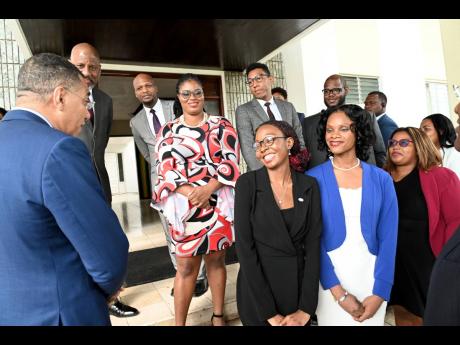PM calls for new civil service
Too many unwilling to use initiative, identify opportunities, says Holness
As the economy continues to bounce back from the ravages of the pandemic, Prime Minister Andrew Holness is lamenting that these strides are not being matched in other areas of national life, pointing to the education sector, the escalating crime rate, and solid-waste management as sectors in which Jamaica is failing.
Delivering the keynote address at Wednesday’s farewell luncheon for seven Jamaica House Fellows, Holness also acknowledged the need to improve the country’s civil bureaucracy – the ability of a country to administer its affairs.
“I think we are doing well in economic policy. In this region, we are the only country that can report post-COVID, a reduction in debt, an increase in employment, and an increase in growth – all three things together,” he said.
“We are doing well in other areas as well, but there are some challenges – education, law and order, simple things such as the collection of municipal waste. These are issues that give us cause for concern,” the prime minister pointed out.
“ ... There is the issue now of the people – the leadership, the human capital, with the socio-emotional intelligence to have dreams, convert those dreams into visions, convert the vision into policy and law and then to implement. We have many dreamers in our society, we have some visionaries, we have a lot of policymakers - all of you in this room, but where are we falling down? Implementation,” he acknowledged.
He said the capacity of public bureaucracy would have to be looked at in tackling this challenge, ensuring that key areas are staffed with well-trained, experienced people who are willing to take the initiative and identify opportunities to improve.
Holness said government institutions are partly populated by people who are not inclined to use their initiative to change the status quo even when things are clearly not working and the system is in need of an overhaul.
He noted that Jamaica is in the phase of its development where complacency issues, monitoring, and evaluation have taken on an outsized role.
“ ... Public servants are loath to act because they don’t want to run afoul of the rules, and that dulls the organisation, kills initiative, and it slows down your rate of output. What I am saying is no way to suggest that rules should be removed or loosened. What I am saying is we need a new breed of technocrats, a civil servant, a public servant who is consummate in complying with the rules and delivering … . That is what the country needs, and for us to engender that, we need to create a nursery, an oasis, where we bring in talent and expose them to the difficult choices that are often operating in conflict with each other and you have to resolve them,” he said in his address.
Finance and the Public Service Minister Dr Nigel Clarke, who gave remarks at the function ahead of the prime minister, spoke in the same vein.
“In order for us to have a modern, functioning, vibrant, plural society, we need a public bureaucracy able to steward and take that forward, and the observation is that there is no country that has led the world without a first-class public bureaucracy,” he said. “And that’s what we hope to achieve through this Jamaica House Fellowship programme, which gives young people an opportunity to be exposed to Government at the highest level, and regardless of what you choose to do later in life, it accrues to the society, the experience that you gather here.
“We have a lot of work to do in realising that vision and making sure that we have a public sector that is fully equipped to take Jamaica forward,” Clarke added.

